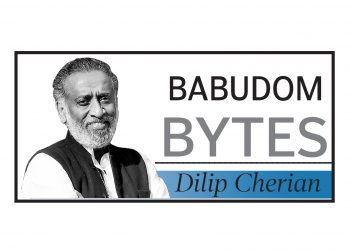Absolutely no changes, a rarity in this top team, is not surprising. This Government has a track record of preferring the tried and tested in crucial spots, which certainly, these ones are.
President Droupadi Murmu has inherited four senior officers of the Rashtrapati Bhavan from the Ram Nath Kovind presidency, including the President’s Secretary Kapil Dev Tripathi, Joint Secretary Ajay Bhadoo, Officer on Special Duty Jaganath Srinivasan and Press Secretary Ajay Kumar Singh. Though these officers had been working on a co-terminus basis with the term of Kovind, the Appointments Committee of the Cabinet has approved the extension of their tenure for a period of two months beyond July 25 or until further orders.
We wonder if an able and proven competency in governance and government won’t make the new President assemble her own team? Even if, traditionally, there is a sign-off, by the System (read Cabinet Secretary) it’s usually a minor presidential privilege some choose to exercise more than others. Most likely, Murmu will eventually assemble her own team of trusted aides, and these officers will be at hand to ensure a seamless transition as the President settles into her role.
Tripura gets a new DGP
When senior IPS officer Tapan Deka was appointed as the new Director of the Intelligence Bureau (IB), he superseded four IB colleagues, who quickly decided to move out and seek what is called a “respectful rehabilitation” in babu parlance. Deka checks many boxes, to occupy this especially sensitive post. His skills weren’t in question and seniority issues were mainly the ones in play. However, sensing some unhappiness over Deka’s appointment, the government has moved quickly to acquiesce to
their request.
Special Director of Intelligence Bureau, Amitabh Ranjan, who was among the four IPS officers superseded by Deka, has been appointed as the new Director General of Police of Tripura. Sources have informed DKB that Ranjan had a major backer in Tripura chief minister Biplab Kumar Deb, who called Union Home Minister Amit Shah to clear all the formalities for the 1988-batch IPS officer’s appointment. The state is headed for assembly elections early next year.
DKB has learnt, that three other superseded officers have been moved out of IB. Special Director Manoj Kumar Lal, has returned to his parent UT cadre, while Manoj Yadava has been sent to the National Human Rights Commission as Director General (Investigations). Only Anish Dayal Singh, Deka’s junior, continues to work in IB as Special Director.
Calm has been restored by placing these IPS officers in other rank-appropriate positions. It needs to be noted that Deka’s is not the first instance of a junior officer being promoted to the top position in a hierarchy-driven organization. The new IB chief is junior to Manoj Yadava, Manoj Kumar Lal and Amitabh Ranjan. And even though seniority is not the sole criterion for appointment to a prestigious post like this, the episode does point to perhaps taking a fresh look at the promotion policy and managing succession among the senior police officials.
Vacancies at Centre hit new low
Even as the Centre continues to grapple with a shortage of civil service officers, the Ministry of Personnel has revealed that the number of vacancies advertised by the UPSC has fallen by more than 50 per cent since 2014!
The Minister of State for Personnel Jitendra Singh reportedly informed Parliament that UPSC recommended 4,119 candidates for Central government jobs in 2021-22, which is the lowest number of job positions at the Centre in the past 10 years. As the Modi sarkar sets its sights on the 2024 general elections, it is clear that governance will be a big factor in its claims to retain power. As of now, the panel’s report should set off alarm bells within the ruling dispensation. Shortage of IAS officers is compelling many states to take recourse to appointing non-cadre officers in cadre officer posts, and also continuing them in such posts beyond permissible limits. Also, we have noted several IAS officers holding multiple assignments due to the dearth of eligible officers.
Certainly, the shortage of IAS officers is nothing new. Apparently, even back way in 1951, the number of appointed officers compared to the required was low. There were 336 fewer officers than the required strength of 1232 officers. But over the decades instead of bridging the gap, it has steadily widened.
But the bigger question is why have successive governments not managed to solve the issue, despite diligent annual cadre reviews and recommendations of numerous panels? Hopefully, the urgency recommended by the Modi panel will stir the Centre into moving determinedly in this direction.
Share a babu experience! Follow dilipthecherian@twitter.com. Let’s multiply the effect.
